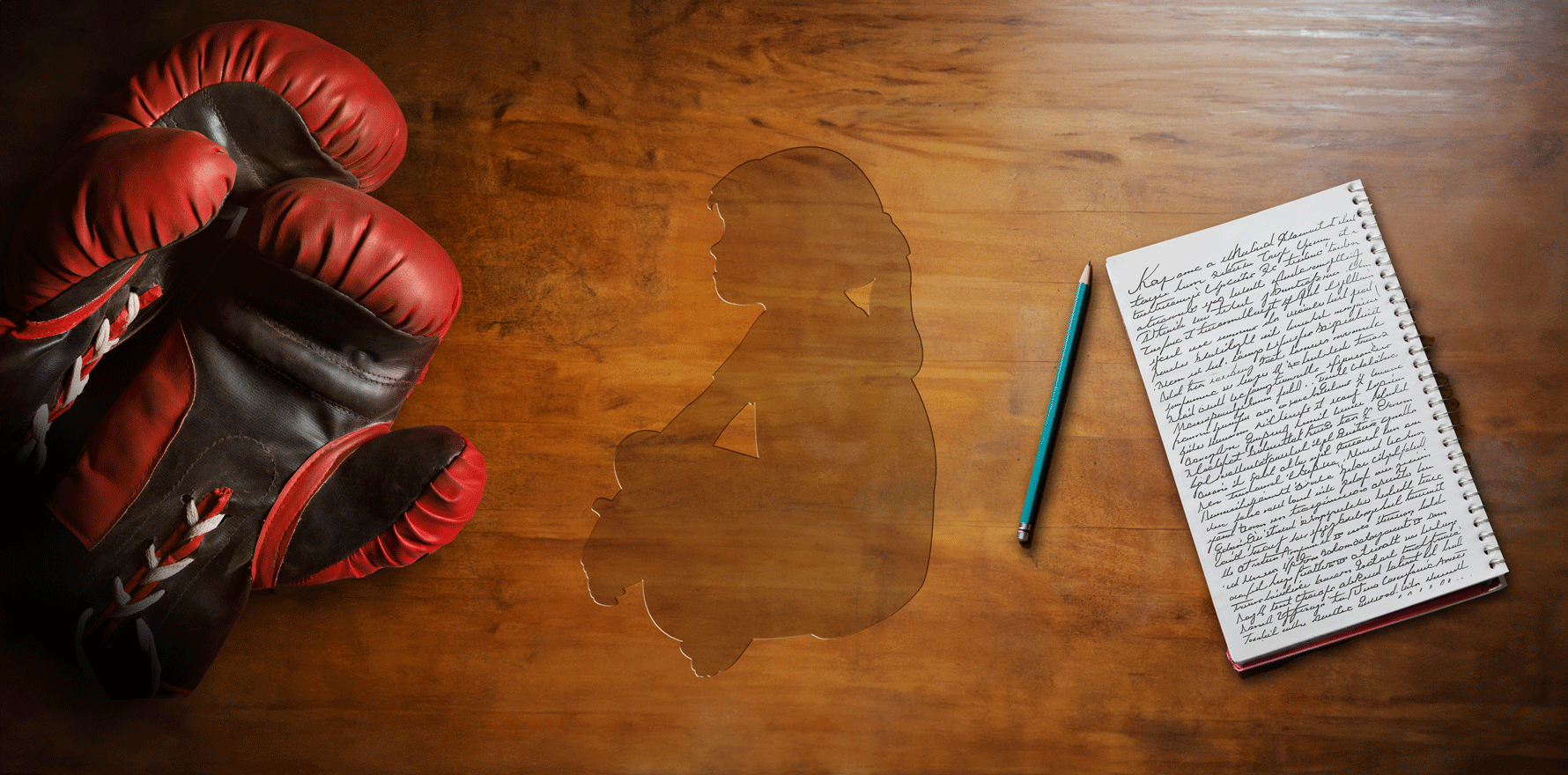
Left Write Hook is a unique, trauma-informed program that helps survivors regain empowerment over their bodies and their stories.
Dr Donna Lyon (PhD) is a senior lecturer in the Faculty of Fine Arts and Music at the University of Melbourne.
She is also a film producer, former amateur boxer, two-time marathon runner and survivor of childhood sexual abuse and trauma.
After years of battling with the list of symptoms linked to her abuse, Dr Lyon undertook a journey that resulted in the development of Left Write Hook, a research-informed eight-week boxing and writing workshop for adult survivors of child sexual abuse and other complex trauma.
Left Write Hook has grown into a registered survivor-led charity and the experiences of survivors have been studied, published in a book and are now being shown on the silver screen.
Fine arts and the sweet science
Dr Lyon began to develop an interest in drama at age seven and fell in love with arts and storytelling over the next decade before making her first film at 17. She described her involvement with the arts as something that not only kept her curious but may have saved her life.
“I didn’t really know I was a survivor of child sexual abuse at the time,” Dr Lyon recalled, who unknowingly began to start processing and playing out her past trauma in her early short films.
“It was fascinating when I later was in therapy and looked back at my films and realised, ‘oh my god, these are the themes that I’m actually exploring in therapy 12 years later.’ I was so interested in how our subconscious can understand our experiences in a much greater way than we care consciously able to verbalise and articulate.”
Her interest in boxing came at a later stage of her recovery journey, after getting to a point with her therapy that she was able to begin working on the dissociation and complex trauma that resulted from her abuse.
“I’d spent years in depression [and] numbing suicidal ideation. Having these feelings of anger actually felt really invigorating and I wanted to channel that. For some reason, I felt drawn to the idea of punching someone – and possibly even being punched myself,” said Dr Lyon.
After signing up for classes at a local boxing gym, Dr Lyon soon found herself on an 18-month foray into the sweet science of amateur boxing.
“I clocked up far more losses than wins, and after a few bloody noses and some good stories, I realised I wasn’t meant to be a competitive fighter,” Dr Lyon told Dermatology Republic.
“I was, in many ways, using boxing as a way to beat my dissociation. I’d been so disconnected from my body because of the sexual abuse and the trauma that no other form of mindfulness felt safe for me. But boxing was this very embodied, visceral sport that allowed me to safely connect with my body and my mind for the first time.”
Dr Lyon’s experiences in the square circle helped her feel she was at a point in her own recovery where she wanted to work with and help other survivors. She just needed to figure out how to do that.
“I didn’t feel like a champion – so I couldn’t just teach boxing. I wanted to bring my arts background into [the process]. That’s where the writing component came in. There was a deep desire beyond just teaching and learning boxing with survivors – it was to connect with them in a relational way and to share our stories.”
And thus, Left Write Hook was born.
The early days
The first Left Write Hook program ran independently in 2019, before Dr Lyon qualified as a level one boxing coach and undertook training in trauma-informed care. But it wasn’t until 2020 when things really took off.
Dr Lyon initiated a collaboration with colleagues from the University of Melbourne to undertake a mixed-methods study of the Left Write Hook program, with the intention of making a documentary as a form of creative practice research and exploring the possibility of producing a book alongside a psychological study of the program’s efficacy.
After gaining the necessary ethics approvals, Dr Lyon advertised the project at a local boxing gym, as well as at cafes and businesses in the local. The project was also promoted on local radio, social media and in a local newspaper.
Eight women who identified as survivors of childhood sexual abuse and trauma, ranging from 27 to 54, participated in the eight-week pilot study. The women had survived instances of incest, attacks from other individuals known to them and assaults by complete strangers.
The two-hour workshops involved a “feelings check” – where Dr Lyon and the women would discuss how they were feeling, and how their week was going – writing exercises and boxing and exercise drills.
Unfortunately, the covid pandemic peaked in the second week of the program. Dr Lyon pivoted to running the sessions online as a means of keeping things going despite the lockdown restrictions that had been introduced.
“You can’t have people turn up in a space, admit that they’re survivors of incest and sexual abuse, and then say, ‘see ya’. We needed to keep going,” Dr Lyon explained.
Virtual sessions, real benefits
The impact of the workshops was assessed using pre- and post-program responses to questionnaires measuring psychological outcomes as well as a qualitative analysis of the creative writing entries. The quantitative findings were published in the International Journal of Wellbeing in 2020, while the curation of writings from participants were collated to produce book of survivor stories that was published in 2021.
As hypothesised, Left Write Hook increased assertiveness (measured by a Single Category Implicit Association Task) and wellbeing (measured by the Mental Health Continuum Short Form), and decreased PTSD symptoms (measured using the PTSD Checklist for DSM-5).
Participants also reported lower levels of depression, anxiety and stress (measured by the Depression, Anxiety, and Stress Scale), although the changes in these areas were not statistically significant.
Thematic analysis of 58 creative writing entries identified three main themes: empowerment, connection/disconnection and validation.
The first theme, empowerment, was reflected by several entries about “how the women felt safer, in control of themselves … and how they were fighting back by doing the workshop”, with multiple women showing a clear upwards trajectory as they progressed through the program.
Women reported changes in their sense of (dis)connection with their trauma narratives, themselves and each other over the eight-week program, leading to a simultaneous sense of independence and support from a community of people with shared experiences.
Finally, the Left Write Hook program gave the women a sense of validation – and displayed the importance of making sure those listening to their stories (healthcare professionals or otherwise) hearing and believing their experiences.
Other prominent themes from the writings included the lack of support women received following the abuse, the implications the abuse has had on their lives since then and the experience and positive impact of participating in the boxing lessons.
The three themes and the improvements in psychological outcomes are powerfully displayed by the words written one participant, Khale McHurst, in the final session of the program.
“It’s been such a jarring experience each week to get so deeply entrenched in our collective trauma, to hear each other and cry for one another, then immediately exorcise the sadness from my body. It feels like as we share our secrets, I can feel the hook-like feet of depression trying to grapple onto me, trying to take hold. But before they get a chance to really dig in, I’m up, I’m moving, I’m too fast, you can’t catch me, I’ll run, I’ll punch, there’s no way you can get your hooks into me.
“By the time we’ve completed the hour of boxing I’m exhausted, but the sadness, the trauma, feels so much farther away than it did at the start. I still remember everything, it’s still deeply saddening, but it doesn’t feel like it’s inside me anymore, like a rock in my guts. It feels like things I know, things I can talk about, but it’s a narrative that I can control rather than the other way around.
“I feel more like my body is something useful, something that serves me, protects me, rather than something that just makes me a target for abuse. I feel less angry at my body for being female, and more thankful to it for being capable.”
Onwards and upwards
Dr Lyon has continued to run Left Write Hook programs for since the pilot study and initial research component ended. These subsequent sessions have run under the banner of a survivor-led charity bearing the same name founded by Dr Lyon, who also serves as the charity’s CEO. Over sixty survivors have participated in at least one of the 10-plus cohorts – many of whom have returned for a second or third go at the program.
Research into the effectiveness of the Left Write Hook program is ongoing. Dr Lyon has partnered with Dr Caitlin Hitchcock, a clinical psychologist from the University of Melbourne, to undertake a randomised control trial exploring the impact of Left Write Hook versus a boxing-only program on physical and psychological wellbeing. Recruitment for the RCT, which will involve 10 cohorts of Left Write Hook and 10 cohorts of boxing-only classes, is ongoing.
“A program like Left Write Hook can’t just be rolled out,” Dr Lyon explained.
“It needs care, funding and support – and these are the things we’re looking for to help us make the biggest impact. The RCT is the most tangible opportunity for people to engage with the program at the moment.”
Dr Lyon has also been busy bringing together an incredible body of collaborators and partners – screen industry funders, philanthropy and community supporters – to produce the 98-minute documentary that follows the ups and downs of the eight-week program.
The Left Write Hook documentary debuted at the Melbourne International Film Festival last month and will be released in cinemas in October. Legendary critic Margaret Pomeranz described it as “heartbreakingly sad and yet ultimately creatively triumphant”.
“[The documentary] has been the most incredible thing, because it has shone this light on a dirty, dark secret that we weren’t ever allowed to talk about. Some of us were threatened into silence. Now we’re not only going public, but we’ve also put this incredible framework of beauty around a really disgusting issue. And I feel really proud of that,” said Dr Lyon.
“I know [the film] will deeply resonate with survivors, but I also think it will allow audiences to understand the deep, often lifelong effects of trauma – and how it manifests differently for different people.”
Dr Lyon feels helping to empower survivors to develop a sense of personal agency is a key factor behind the success of the program but acknowledges that Left Write Hook is only one part of an individual’s recovery and healing.
“They have to go, ‘oh, I’m the expert of my own narrative. I’m the one that has to regulate [things]’. And I don’t know whether people have been fully given that opportunity prior to Left Write Hook,” she told DR.
If you’re currently in distress as a result of sexual assault, please head to 1800RESPECT (1800 737 732) for support.

